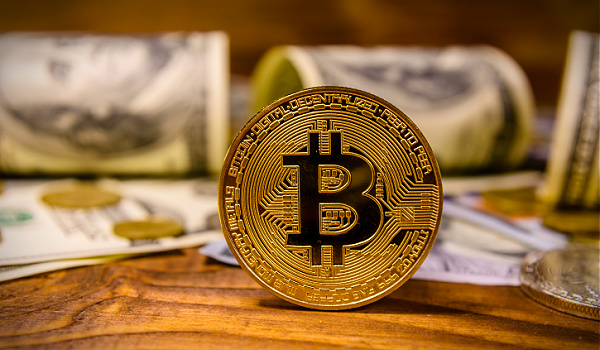By John Sarson | Sarson Funds, Inc.
Trump recently took centerstage at the annual CPAC convention. He said that he alone could prevent World War 3, presumably referring to a potential US/China conflict. How might Trump’s plan to weaken a future adversary such as China inadvertently weaken the dollar and help Bitcoin? Indulge the following opinion.
Trump has historically found fertile political ground suggesting that he would hold foreign governments accountable for harm they have inflicted on the United States. (See for reference, “build wall, make Mexico pay for it”.)
For the coming election cycle, especially given the conclusions recently reached by the Department of Energy that the COVID-19 pandemic was most likely caused by a lab leak in China, I expect a major discussion in relation to the pandemic will be a question of responsibility.
Who should be held accountable for the spread of the virus, and what actions should be taken to hold those accountable responsible and to prevent future pandemics?
In this regard, Trump’s track record can give a hint to how he may proceed, if hypothetically, he were to be re-elected. Historically Trump has taken a hardline approach towards China, accusing the country of not being transparent about the virus’s origin, in its handling of the pandemic and going Tit-for-tat on trade sanctions in 2020. Coupled with Trump being vocal about his displeasure with China’s trade policies and the trade deficit between the two nations, Trump is likely to suggest that the US should take some action against China regarding the COVID-19 pandemic.
One possible action that Trump could take in campaigning is that China should be held financially responsible for the damage caused to the United States as a result of the pandemic. One such way that may be proposed for extracting this retribution may be the halting of payments for China’s US Treasury holdings or canceling the obligations all together.
China is one of the largest holders of US Treasury bonds, and any move to halt payments or cancel these debt obligations for these holdings could be framed to have a benefit to the U.S. debt service and or total deficit… at least in the short term. These actions would have a significant impact on China’s economy. This could be seen as a hardline approach by the U.S. towards China, with potential consequences for both nations’ economies. These actions may never be implemented, but it’s this authors’ suggestion that the very socializing of this idea could have a dramatic impact on the treasury market and therefore the U.S. dollar.
If China were to start selling their Treasury holdings in anticipation of a Trump presidency, it could cause a significant decrease in demand for US Treasury bonds, leading to a decrease in the value of the U.S. dollar. This could potentially create even higher funding costs for the U.S., which is already grappling with the reality that, in today’s higher interest rate environment, national debt service as a line item in the U.S. budget iis up nearly 100% over the last two years and is expected to continue to rise quickly,
According to the non-partisan Cato Institute, interest and principal payments on national debt which total $863 Billion in 2023, already exceeding national military spending ($746 billion) and Medicare spending ($700 billion). It is estimated that within a decade interest payments alone will reach $1.2 Trillion annually, eclipsing all other categories of federal spending before even considering principal payments.
For those reasons, US debt service is likely to be a topic during the 2024 Presidential campaign.
While canceling the principle or interest payment on this debt may seem like a good idea to some, since over $1 Trillion of the debt is owned by China, doing so, or even suggesting doing so, could have ripple effects on both China, the U.S. and other countries and their currencies, leading to a global economic effects that could be be felt the greatest by the United States.
Reduced demand for U.S. dollar denominated assets, such as Treasury obligations could potentially lead to a decline in the U.S. dollar. A decline in the US dollar could likely, in turn, have an immediate and positive impact on the price of assets that are dollar denominated, a phenomena well understood by gold investors. Oil, gold, Bitcoin and Ethereum, (the very currency that denominates Trumps wildly popular NFT Collection) could all see their prices in dollars increase as the actual purchasing power of dollars declines.
It’s long been wondered when, if ever, China would stop buying US Treasury debt. Could this rhetoric, even if never realized, be the proverbial straw to break the camel’s back? If it ends up being the case, expect to see Bitcoin take a more prominent role in the foreign reserve currency mix held by China and other nations.
It is worth considering that Trump need not even be elected to potentially see this scenario put in motion. The rhetoric alone could conceivably be enough to spur action. If you were China, would you start unloading debt now, or wait till it was too late?
The good news is it’s still not too late for investors to establish “insurance holdings” of Bitcoin or gold.
Not financial advice, speak with your Financial Advisor before making any investment decisions.
The thoughts expressed herein are the sole opinion of the author, John Sarson, who holds Bitcoin (BTC) and is not necessarily reflective of Sarson Funds or any other media outlets.
Please visit SarsonFunds.com/ESG to learn more about digital currencies and other ESG cryptocurrency projects.








